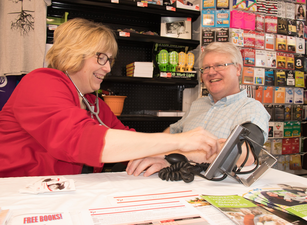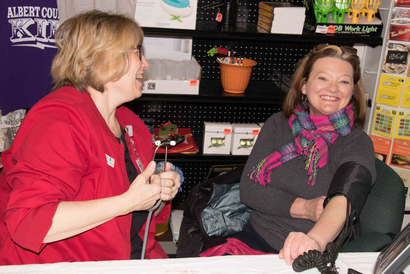 Bev Stevens taking the blood pressure of Pharmacist Craig McDermott at the Albert County Pharmacy
Bev Stevens taking the blood pressure of Pharmacist Craig McDermott at the Albert County Pharmacy  You can have blood pressure checked at the Albert County Pharmacy the first Thursday morning of each month
You can have blood pressure checked at the Albert County Pharmacy the first Thursday morning of each month “High blood pressure is the number one risk factor for stroke and a major risk factor for heart disease,” according to the Heart and Stroke Foundation of Canada.
“It is recommended that your blood pressure is checked at least once a year,” says Bev. “If you have a high reading, you should have it checked at least two more times on two separate days to determine if it is consistently high.”
If Bev notices someone has high blood pressure, she will discuss a plan. She may suggest someone check it monthly, see a doctor or nurse practitioner right away, or even call 911 for immediate care.
Just because you once had low-risk readings doesn’t mean you no longer need to be checked. Blood pressure changes throughout your life. For example, a woman’s blood pressure might increase during pregnancy, menopause or while taking birth control pills. Also, your blood pressure might increase because of changes in your diet, activity or lifestyle.
The advantage of checking your blood pressure at the pharmacy is that there is no need for an appointment. Also, sometimes people are anxious or nervous upon arrival to see the doctor or nurse practitioner and that might drive up their blood pressure – this service allows you to be checked in a more relaxed atmosphere.
What are healthy levels?
According to the Heart and Stroke Foundation, the following blood pressure levels are linked with varying risks of stroke or heart disease.
· Low risk: 120/80
· Moderate risk: 121 to 139/80 to 89
· High risk: 140/90 or higher
· High risk for diabetics: 130/80 or higher
If you’re over 80 years of age, ask your doctor or nurse practitioner about your optimal level.
What happens at the pharmacy?
The whole process takes only five to ten minutes. You sit in a comfortable chair and Bev places an inflatable cuff on your upper arm (it helps if you wear short sleeves or sleeves that can be pushed up above your elbow). The cuff gently squeezes your arm for a moment and then releases.
Bev writes your reading onto a small chart that you can keep in your wallet (so you can keep track of how your blood pressure changes). Bev discusses your readings with you and answers other questions you may have. You can also bring in your home blood pressure monitor to make sure its readings are accurate.
The process is entirely confidential. Although it takes place in the pharmacy, Bev will ensure other people don’t hear your results. She might suggest you tell your doctor about the readings but that is entirely up to you.
What if my blood pressure is high?
If your readings are high, Bev will encourage you to talk to your doctor or nurse practitioner. Options include changes in diet, increasing exercise or using medication.
How can I avoid high blood pressure?
· Reduce intake of sodium (salt on food as well as sodium in prepared foods).
· Eat a healthy diet.
· Exercise.
· Maintain a healthy body weight.
· Don’t smoke.
· If you drink alcohol, limit consumption to 2 drinks/day (max.10/week) for women and 3 drinks/day (max.15/week) for men.
· Talk to your doctor or nurse practitioner about other options.
Who offers the service?
Bev Stevens is a Licensed Practical Nurse from the Albert County Health and Wellness Centre. The Albert County Pharmacy in Riverside-Albert hosts the service the first Thursday of every month from 9:30 am to 12:30 pm.
The Albert County Health and Wellness Centre, as well as many community initiatives, is supported by the Bennett and Albert County Health Care Foundation. When you support the Foundation, you support the Health Centre and the broader community.
Pictures & text by Janet Wallace
 RSS Feed
RSS Feed